Juliet Marion Hulme (October 28, 1938 - April 10, 2023)
[currently Anne Perry]
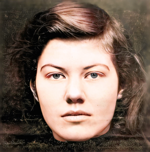 Juliet was born on October 28, 1938 in Greenwich, UK, as first child of Henry and Hilda Hulme. At the time of her birth, her father had recently assumed the post of Chief Assistant at the Royal Observatory.
Juliet was born on October 28, 1938 in Greenwich, UK, as first child of Henry and Hilda Hulme. At the time of her birth, her father had recently assumed the post of Chief Assistant at the Royal Observatory.Juliet was an extremely bright and, by her own description, a mischievious and precocious child, but she was also a sickly one, suffering from several different, serious, respiratory ailments when young. In addition, she suffered severe psychological trauma during the London Blitz, when she was two. It was reported that she suffered from debilitating screaming nightmares for several weeks after this episode, perhaps for months, and on and off during her childhood. The birth of her brother Jonathan in March 1944, when she was five, was also a traumatic experience for Juliet because of her mother's serious post-partum complications and hospitalization. First, her mother was spirited away from home in the night, then hospitalized for an extended period with no visitors, then her father left her to go to America and she was sent away, alone, to the North of England (probably Liverpool). This was to be the first of many sudden and lengthy separations from her family, and there is considerable evidence that the accumulation of all her childhood separations from her family, and from her Mother in particular, had a profound effect on Juliet Hulme.
In the winter of 1944, when Juliet was six, she contracted bronchitis, which became severe pneumonia, and Juliet came close to death. It was reported that the physician called to the house to see Juliet told her mother he would be back the next morning to sign her death certificate. Juliet survived, but the episode had an extreme effect on Juliet and her family. She was withdrawn from school and remained sickly and largely sheltered and housebound for the next two years. In the mean time, the War ended and her father was promoted within the Admiralty to Director of Naval Operational Research, then becoming Scientific Advisor to the Air Ministry in 1946.
When she was eight, in late 1946, Juliet again contracted another serious case of pneumonia. After she had recovered, on the advice of a physician, Juliet was sent to the Bahamas to live with the Brown family. She remained with them for 13 months, from the age of eight, until she was nine.
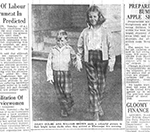 In late 1947, Dr Hulme was offered and accepted the position of Rector of Canterbury College in Christchurch, New Zealand. Juliet's parents then decided to send her to the Bay of Islands in the northern tip of the North Island of New Zealand, for the sake of her health. When she was about ten, Juliet apparently suffered another health crisis, and she was confined to a sanatorium. This crisis either precipitated or approximately coincided with the emigration of her family to New Zealand in mid October 1948. Pictures of Juliet from this time, just after the arrival of her family, show her to be a bright, serious and pretty child, with a round face and a very direct gaze. Hilda Hulme testified that Juliet was clinging and hard to discipline when the family was reunited.
In late 1947, Dr Hulme was offered and accepted the position of Rector of Canterbury College in Christchurch, New Zealand. Juliet's parents then decided to send her to the Bay of Islands in the northern tip of the North Island of New Zealand, for the sake of her health. When she was about ten, Juliet apparently suffered another health crisis, and she was confined to a sanatorium. This crisis either precipitated or approximately coincided with the emigration of her family to New Zealand in mid October 1948. Pictures of Juliet from this time, just after the arrival of her family, show her to be a bright, serious and pretty child, with a round face and a very direct gaze. Hilda Hulme testified that Juliet was clinging and hard to discipline when the family was reunited.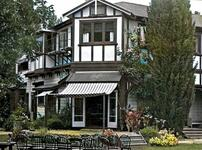 Juliet's reunion with her family in Christchurch was to be short-lived. Hilda Hulme testified that she and her husband soon became concerned with the state of Juliet's health and, in early 1949, Juliet was sent away to Queenswood in Hastings, a private boarding school based on Rudolf Steiner principles, on the eastern coast of the North Island, on Hawke's Bay. Hilda Hulme also testified that Juliet was very unhappy there, and she returned to her family within the year. It is likely that Juliet was tutored privately for the remainder of the 1949 school year.
Juliet's reunion with her family in Christchurch was to be short-lived. Hilda Hulme testified that she and her husband soon became concerned with the state of Juliet's health and, in early 1949, Juliet was sent away to Queenswood in Hastings, a private boarding school based on Rudolf Steiner principles, on the eastern coast of the North Island, on Hawke's Bay. Hilda Hulme also testified that Juliet was very unhappy there, and she returned to her family within the year. It is likely that Juliet was tutored privately for the remainder of the 1949 school year. Early in 1950, Dr Hulme moved his family into the Ilam homestead, the official residence of the Rector, located on the grounds of the proposed new 'Ilam' site for Canterbury University College. The homestead was a grand colonial house, with spectacular gardens, built near a meandering confluence of the river Avon on the western outskirts of Christchurch. Nearby were horse paddocks, open grazing farmland, and the CUC's School of Fine Art, the only department to have moved to the Ilam site. Most students of the School were young women. Ilam was to become a busy centre of College social functions and, of a December, Dr Hulme would throw open the grounds to students studying for finals, bringing them lemonade on the lawns.
Early in 1950, Dr Hulme moved his family into the Ilam homestead, the official residence of the Rector, located on the grounds of the proposed new 'Ilam' site for Canterbury University College. The homestead was a grand colonial house, with spectacular gardens, built near a meandering confluence of the river Avon on the western outskirts of Christchurch. Nearby were horse paddocks, open grazing farmland, and the CUC's School of Fine Art, the only department to have moved to the Ilam site. Most students of the School were young women. Ilam was to become a busy centre of College social functions and, of a December, Dr Hulme would throw open the grounds to students studying for finals, bringing them lemonade on the lawns.
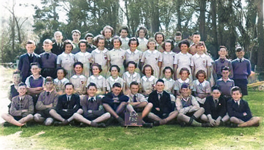 Young Juliet was enrolled at Ilam School, an elementary and junior school virtually across the road from the homestead, and she apparently spent two happy years there. These two years spent close to her family were probably close to idyllic for Juliet, but they were a nightmare for Canterbury College and for Juliet's father.
Young Juliet was enrolled at Ilam School, an elementary and junior school virtually across the road from the homestead, and she apparently spent two happy years there. These two years spent close to her family were probably close to idyllic for Juliet, but they were a nightmare for Canterbury College and for Juliet's father.
Meeting Pauline
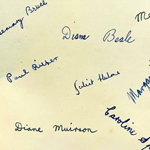 When it came time for Juliet to enter high school, in February 1952, she was apparently enrolled briefly at St. Margaret's, a private Anglican girls' school north of Hagley Park in Christchurch. Hilda Hulme testified that Juliet was given intelligence tests at this time, scoring very high (actually, Juliet Hulme's IQ was measured, then, to be 170). On the basis of these tests, it was decided to place Juliet into a larger, public High School, Christchurch Girls' High School, since Juliet would be stimulated, intellectually, in a larger, busier environment. St. Margaret's was 3 km from Ilam. CGHS was two blocks north of Dr Hulme's office at CUC, and Hilda Hulme was on the Board of Governors of CGHS. These may have also been factors in the decision. Juliet met Pauline Parker - who went by the name 'Paul' - at CGHS. This is the beginning of the time period covered in the movie 'Heavenly Creatures'.
When it came time for Juliet to enter high school, in February 1952, she was apparently enrolled briefly at St. Margaret's, a private Anglican girls' school north of Hagley Park in Christchurch. Hilda Hulme testified that Juliet was given intelligence tests at this time, scoring very high (actually, Juliet Hulme's IQ was measured, then, to be 170). On the basis of these tests, it was decided to place Juliet into a larger, public High School, Christchurch Girls' High School, since Juliet would be stimulated, intellectually, in a larger, busier environment. St. Margaret's was 3 km from Ilam. CGHS was two blocks north of Dr Hulme's office at CUC, and Hilda Hulme was on the Board of Governors of CGHS. These may have also been factors in the decision. Juliet met Pauline Parker - who went by the name 'Paul' - at CGHS. This is the beginning of the time period covered in the movie 'Heavenly Creatures'.The girls first met in February 1952. However, the relationship did not start in earnest until the second term of school, beginning in May. In June, Juliet came home from school and told her mother, 'Mummy, I've met someone at last with a will as strong as my own'. Juliet and Pauline initially bonded over their shared experiences of childhood illness. The girls then grew closer and closer. Pauline's mother told Juliet's mother that she was pleased at the friendship because Pauline had been a lonely child with difficulty in making friends. This apparently normal friendship lasted only a month or two before giving way to something much more intense.
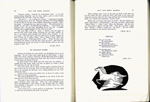 In August 1952, the two girls went for a bicycle ride into the country where they stopped by some light bush, removed their outer clothing, and ran among the bushes ecstatically. They were so ecstatic that they went home leaving their clothes behind them. When referencing this episode, Pauline said that previously they had just been friends, but after this there was an indissoluble bond between them. It would seem that two unusual kindred spirits had come together. From then on they began to build up and share a rich fantasy life.
In August 1952, the two girls went for a bicycle ride into the country where they stopped by some light bush, removed their outer clothing, and ran among the bushes ecstatically. They were so ecstatic that they went home leaving their clothes behind them. When referencing this episode, Pauline said that previously they had just been friends, but after this there was an indissoluble bond between them. It would seem that two unusual kindred spirits had come together. From then on they began to build up and share a rich fantasy life.By the end of 1952 they developed an increasing urge to write. They had their own fictional characters and they would creep out at nights for midnight sprees in which they would act out these fictional characters until the early hours of the morning.
Juliet was taken to Cashmere Sanitorium after contracting tuberculosis on the 21st of May 1953. One week later her parents traveled abroad to the United Kingdom. This trip was described by the Hulmes as a holiday, but it was more likely that dr. Hulme was attempting to secure a new job. Juliet spent fout months of quarantine and isolation in Cashmere Sanatorium, an experience which had a profound effect on her.
Gear up for murder
By the end of 1953 both Pauline and Juliet’s parents actively tried to intervene in the relationship. Honorah Parker seemed to be the person spearheading this, at least in the mind of Pauline. Pauline and Juliet saw less and less of each other. Pauline’s entries in the diary started to become darker, and began making references to self harm.The teenagers were finally reunited in late January 1954, but by early February, Honorah Parker has separated the girls once more. These constant separations planted a seed of hate inside Pauline. This growing animosity was directed at her mother. At the end of april 1954 the girls started concocting plans to remove the 'threat of their separation'. In the mean while the Hulme family started to disintegrate, with dr. Hulme beeing effectively fired in March 1954, and actually departing in June 1954, and his marriage to Hilda falling apart by her affair with Walter 'Bill' Perry. Juliet was to leave New Zealand for South Africa in early July 1954.
On Tuesday June 22, 1954 Juliet actively helped Pauline Parker kill her mother Honorah Parker, in Victoria Park.
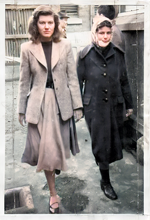
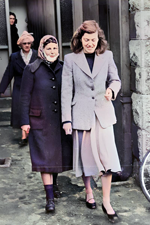
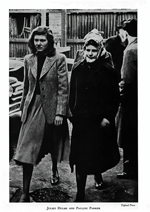 Initially, Juliet denied involvement in the crime, but later she made full, detailed statements to police, which were entered into evidence during the trial. It is Juliet's statements which have provided most information about the murder itself. Juliet was subjected to a battery of physical and psychological testing in the six weeks between the murder and the trial.
Initially, Juliet denied involvement in the crime, but later she made full, detailed statements to police, which were entered into evidence during the trial. It is Juliet's statements which have provided most information about the murder itself. Juliet was subjected to a battery of physical and psychological testing in the six weeks between the murder and the trial.Press reports commented extensively on her striking appearance and her bearing and her behaviour during the hearing and the first days of her trial; some called it arrogant, others refined, others remorseless. During the final day of her trial, however, during the summing up and sentencing, Juliet Hulme sat with her fingers plugging her ears and her gaze downcast. She was convicted of murder and sentenced to an indefinite period of incarceration, at Her Majesty's Pleasure.
at Her Majesty's pleasure
 Many factors went into the sentencing and decisions were made all the way up to the level of Secretary of Justice and the Minister of Justice. Juliet benefitted from a recent change in the law which forbade capital punishment for persons under 18 years of age convicted of capital crimes (this was the first case, though the law was 3 years old), and incarceration 'At Her Majesty's Pleasure' for an indefinite duration was automatically prescribed. This sentence ensured that periodic review would be made of her 'progress toward rehabilitation' and it also allowed for highly conditional terms of release. This was an era of quite sweeping reform and change in the NZ system of justice and there was an official emphasis on rehabilitation and re-integration into society, especially where young offenders were concerned.
Many factors went into the sentencing and decisions were made all the way up to the level of Secretary of Justice and the Minister of Justice. Juliet benefitted from a recent change in the law which forbade capital punishment for persons under 18 years of age convicted of capital crimes (this was the first case, though the law was 3 years old), and incarceration 'At Her Majesty's Pleasure' for an indefinite duration was automatically prescribed. This sentence ensured that periodic review would be made of her 'progress toward rehabilitation' and it also allowed for highly conditional terms of release. This was an era of quite sweeping reform and change in the NZ system of justice and there was an official emphasis on rehabilitation and re-integration into society, especially where young offenders were concerned.The public, however, was outraged by the crime and, perhaps to an even greater degree, by what was perceived to be unrepentent attitudes and callous behaviour on the part of the two girls in the time between their arrest and their conviction. The public was demanding harsh and vengeful punishment and sentencing became very much a political issue in this climate. Juliet and Pauline were sentenced to separate terms of incarceration specifically because it was perceived that absolute separation would be the most severe punishment for them, not because of psychiatric arguments voiced during the trial. They were not permitted any form of communication whatsoever, again to maximize their punishment. Juliet Hulme was perceived by the public to have been the dominant and willful 'ringleader' and it was decided to give her the harshest treatment possible, at least on paper--largely, it would seem, to appease the public's thirst for vengeance.
 Juliet was transferred to Mount Eden prison, a tough, primitive, high-security facility described as medieval in construction and atmosphere, containing both male and female inmates in separate wings and the site of capital punishment in New Zealand. She served out the bulk of her sentence at Mt Eden and there were several hangings in the central yard while she was there. She was placed in solitary confinement for the first three months of her sentence, emerging 'remorseful' according to newspaper reports. During her time in prison, she was not visited by any family member and their correspondence with her was described as very infrequent. In a very real sense, Juliet Hulme faced her punishment for her crime almost completely alone. It appears to have been a galvanizing experience for her.
Juliet was transferred to Mount Eden prison, a tough, primitive, high-security facility described as medieval in construction and atmosphere, containing both male and female inmates in separate wings and the site of capital punishment in New Zealand. She served out the bulk of her sentence at Mt Eden and there were several hangings in the central yard while she was there. She was placed in solitary confinement for the first three months of her sentence, emerging 'remorseful' according to newspaper reports. During her time in prison, she was not visited by any family member and their correspondence with her was described as very infrequent. In a very real sense, Juliet Hulme faced her punishment for her crime almost completely alone. It appears to have been a galvanizing experience for her.
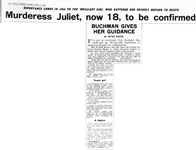
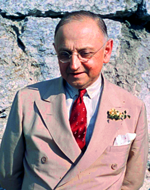 In June 1956 Juliet has converted and baptised into the Anglican faith by the prison chaplain. All under the guidance of dr. Frank Buchman, leader of the Moral Re-Armament Movement. See article for more.
In June 1956 Juliet has converted and baptised into the Anglican faith by the prison chaplain. All under the guidance of dr. Frank Buchman, leader of the Moral Re-Armament Movement. See article for more.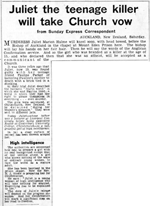
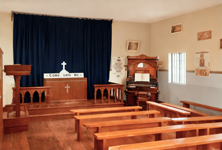
In October 1957 Juliet has been accepted as a communicant of the Anglican church, after a ceremony in the Mount Eden Prison chapel. See article for more.
Although conditions for Juliet Hulme in prison were grim and harsh, she was nonetheless afforded special privileges and her conditions also improved greatly as time went by and the public attended to other things. The Howard League for Penal Reform intervened on Juliet's behalf early in her incarceration and this kindness seems to have made a lasting impression on her. During her sentence she continued her studies at the Advanced level, taking Italian, English and Mathematics, her father's specialty, and she passed University Entrance. Juliet was also tutored on occasion by academics and former colleagues of her father's. She was permitted to correspond with people outside the prison, though all mail was screened and censored and recorded. She was permitted visitors if they had legitimate ties and they obtained the special permission required for each visit, and there were some visits by former classmates and family friends, for example. Apparently she was also permitted to take some meals with the Warden and his family. Overall, both Juliet and Pauline were treated during their incarceration in a 'strongly paternalistic way' according to Glamuzina and Laurie. The Minister of Justice received regular reports on their progress. Juliet was eventually transferred to Arohata Borstal, Wellington, near the end of her sentence.
 In February 1959, a peculiar article appeared in The Sunday Express in London. Here are a few quotations from that article:
In February 1959, a peculiar article appeared in The Sunday Express in London. Here are a few quotations from that article:- "Juliet believes she will be released before her 21st birthday on October 28."
- "She said if she had been a man, and she would have liked to have been a man, she would have loved to have been a German officer."
- "Julie said she never wanted to see her [Pauline] again."
Read and/or download the complete newspaperpage here.
Anne Perry
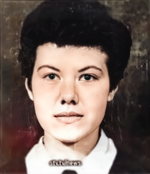 November 16, 1959, soon after her twenty-first birthday, Juliet Hulme was released secretly from prison (a public announcement was made two weeks later) and given an anonymous new identity. She was told to pick a new first name — something ordinary. She reluctantly chose 'Anne'. The terms of her release were that she would leave the country and she would have no contact with Pauline Parker, though these conditions were not made public at the time of her release, for some reason, and the public was led to believe that Juliet's release was final and unconditional. In fact, if she had broken any of the conditions of her release, Juliet would have been subject to re-imprisonment according to the terms of release 'During Her Majesty's Pleasure'.
November 16, 1959, soon after her twenty-first birthday, Juliet Hulme was released secretly from prison (a public announcement was made two weeks later) and given an anonymous new identity. She was told to pick a new first name — something ordinary. She reluctantly chose 'Anne'. The terms of her release were that she would leave the country and she would have no contact with Pauline Parker, though these conditions were not made public at the time of her release, for some reason, and the public was led to believe that Juliet's release was final and unconditional. In fact, if she had broken any of the conditions of her release, Juliet would have been subject to re-imprisonment according to the terms of release 'During Her Majesty's Pleasure'.
To America
After leaving New Zealand in 1959, first for a stopover in Sydney, Australia and then for her destination in the UK, Juliet Hulme became Anne Perry (initially Anne Steward, then Anne Stewart Perry, and finally Anne Perry), a fact revealed in 1994. Her new surname was taken from her mother, Hilda Perry and her stepfather, Walter (Bill) Perry. Anne lived with Walter and Hilda Perry for several years on her return to England.Anne Perry held a variety of jobs in England in the early 60s. She was a flight attendant on domestic UK flights and lived and worked in Newcastle, in the north-east corner of England, for a time. Then, in 1967, Anne Perry was at last granted a visa to live and work in the United States. She made a complete admission of her past to US Immigration authorities, who reviewed the transcript of her trial before granting her a visa. It is not known if her father, Henry Hulme, played any role in securing his daughter's visa, though it is almost certain that he would have been consulted because of the sensitive nature of his high-security position at the time.
So, finally, thirteen years after dreaming about escaping to California with Pauline Parker, Anne Perry came to San Fransisco in the Summer of Love. She was 29 in 1967. While living in San Francisco, Anne Perry was introduced to the Church of Jesus Christ of Latter Day Saints by an acquaintance, and she became a Mormon. She was baptized on april 22, 1968. She made a complete disclosure of her identity and her past to the Church, which welcomed her warmly. Ms Perry has written on the history of the Mormon Church in the UK (So basically Juliet has finally become a saint herself - long after the girls wrote so much about it).
Anne Perry eventually moved to Los Angeles and worked, among other jobs, as an Underwriter by day, while writing at night. She was not able to sell any of her writing. She stuck it out for several years in LA, in a variety of jobs, until she decided she had had enough. She eventually moved back to the UK in the early 1970s.
Succes in the UK
 Back in the UK Anne Perry continued writing for several very lean years with no commercial success. During that time, it appears as if Anne Perry and her father, Henry Hulme, finally reconciled.
Back in the UK Anne Perry continued writing for several very lean years with no commercial success. During that time, it appears as if Anne Perry and her father, Henry Hulme, finally reconciled.Anne Perry's first novel, 'The Cater Street Hangman' was accepted for publication and then published in 1979. Prior to this, she had written several works of historical fiction but had never managed to sell them. By moving into the Victorian era, and the genre of the murder mystery, Ms Perry had at last hit upon a commercial product. Since that time she has worked at a furious pace to build up her reputation, and her readership, with great succes.
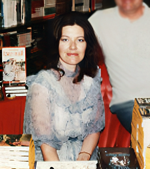 The Cater Street Hangman was the first book in the series to feature the Victorian policeman Thomas Pitt and his well-born wife Charlotte. This is arguably the longest sustained crime series by a living writer. Murder on the Serpentine is the latest (32nd) in the series.
The Cater Street Hangman was the first book in the series to feature the Victorian policeman Thomas Pitt and his well-born wife Charlotte. This is arguably the longest sustained crime series by a living writer. Murder on the Serpentine is the latest (32nd) in the series.

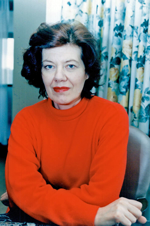 In 1990, Anne started a second series of detective novels with The Face of a Stranger. These are set about 35 years before and features the private detective William Monk and volatile nurse Hester Latterly. The most recent of these (24th in the series) is Dark Tide Rising.
In 1990, Anne started a second series of detective novels with The Face of a Stranger. These are set about 35 years before and features the private detective William Monk and volatile nurse Hester Latterly. The most recent of these (24th in the series) is Dark Tide Rising.Anne Perry has become one of the United Kingdom’s most successful crime novelists, writing over a hundred novels up to this date. She is obsessive when it comes to her writing, to the point that she claims that without writing she would have nothing to live for.
Exposure in Scotland
In 1992 Anne Perry moved to the small town of Portmahomack, on the eastern coast of Scotland, a mile from her mother, in a huge renovated stone barn overlooking the sea.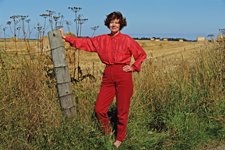 Investigative reporter Lin Ferguson of Sunday News (NZ) revealed in July 1994, when 'Heavenly Creatures' was playing in film festivals, that Juliet Hulme's present identity was Anne Perry. Although filmmakers Walsh and Jackson were aware of the rumours surrounding Juliet Hulme's identity and whereabouts, and their extensive research and attention to known detail actually put many clues to Juliet's new identity into the film, the film was careful not to include the new rumors or explicit statements which would have identified Ms Perry, or Pauline Parker.
Investigative reporter Lin Ferguson of Sunday News (NZ) revealed in July 1994, when 'Heavenly Creatures' was playing in film festivals, that Juliet Hulme's present identity was Anne Perry. Although filmmakers Walsh and Jackson were aware of the rumours surrounding Juliet Hulme's identity and whereabouts, and their extensive research and attention to known detail actually put many clues to Juliet's new identity into the film, the film was careful not to include the new rumors or explicit statements which would have identified Ms Perry, or Pauline Parker.After apparently overhearing a comment made by a New Zealand friend of Anne Perry, Ferguson took up Juliet's trail with 'Mr Walter Perry', the engineer/lodger/lover featured in 'Heavenly Creatures', and the knowledge that the girls had had a burning desire to become published authors. Searching 'Contemporary Authors', Ferguson quickly found an author who listed Walter Perry, an engineer, as her father, and Juliet Hulme's birth date as her own. Phone calls to Meg Davis, Ms Perry's literary agent in London, led to Perry's acknowledgement that she was indeed Juliet Hulme.
Ms Perry has said of her part in the killing that she ‘made a profoundly wrong decision’. Having been told that she would be going to live in South Africa, and with Pauline’s mother standing in the way of the two teenagers both moving there, she feared Pauline would take her own life ‘and it would be my fault’.
She slammed Fran Walsh and Peter Jackson, who were nominated for an Oscar for their “Heavenly Creatures” screenplay, calling them “idiotic movie-makers” who made a film that painted a “grotesque and distorted portrait” of her. She later recanted her statement and said she was caught up in the heat of the moment.
In 1995 she told a reporter for the Village Voice that she could “love” a woman, but never be “in love” with one.
In 1994, just months after her story had come out, Anne did an interview with Terry Gross for Fresh Air / NPR (an American non-profit media organization). So you can hear Anne speak for yourself:
Anne remembers Pauline: “Good dark eyes,” she recalls when pressed. “Short, dark hair… good-looking… a bit heavy… bright.”
Read (and or download) the full four-page newspaper article here, or just the text here.
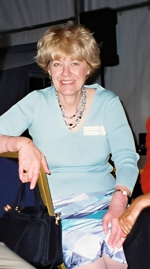
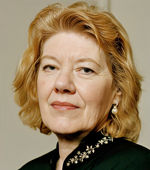
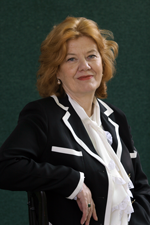

Back in the USA
 In 2017 Anne moved back to the USA, to Hollywood this time, in order to more effectively promote films based on her novels.
In 2017 Anne moved back to the USA, to Hollywood this time, in order to more effectively promote films based on her novels.Also in 2017 Anne started a new book-series featuring the son of Thomas and Charlotte Pitt, Daniel, beginning with 'Twenty-one Days'.
In 2022 she's alive and well, in LA, still writing. According to idolnetworth.com Anne's net worth in 2022 is a staggering $10 million...
Death
In 2023 Anne Perry died, on Monday april 10 in LA, at the age of 84, after been in hospital for about eight weeks. The death, at a hospital, was confirmed by her literary agent Meg Davis. "Ms. Perry’s health had declined since she had a heart attack in December", Ms. Davis said.
Sources:
- the Heavenly Creatures F.A.Q.
- Peter Graham, 'Anne Perry and the Murder of the Century' originally published as 'So Brilliantly Clever', 2011
- truecrimenz.com
- https://benwilliamsblogger.blogspot.com/2014/04/this-day-in-gay-utah-history-april-22nd.html
- https://www.latimes.com/archives/la-xpm-1995-02-18-ca-33317-story.html
- https://www.npr.org/2023/04/21/1171046614/remembering-historical-crime-novelist-anne-perry
- 'Memories of murder', The Guardian - June 29, 1996